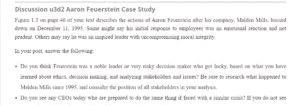Aaron Feuerstein Case Study
When Malden Hills were burned down in 1995, Aaron Feuerstein, the then-CEO, boldly decided against most conventional managerial rules. He decided to maintain the employees’ payments while they waited for the factory to be rebuilt. He considered This decision ethical, but it came at an extra cost to himself and the organization.
Do you need an original copy of the “Aaron Feuerstein Case Study”? Reach out to us. We are available to help.
Do you think Feuerstein was a noble leader or risky decision-maker who got lucky, based on what you have learned about ethics, decision-making, and analyzing stakeholders and issues? Be sure to research what has happened to Malden Mills since 1995 and consider the position of all stakeholders in your analysis.
In making this decision, Feuerstein was ethical. He considered the value of the employees to be an essential factor to protect. Feuerstein demonstrated ethical behavior on a personal level by paying the employees even though they were not working there. Personal ethics are values and principles that a person chooses to follow (Weiss, 2014). His decision was based on his belief that his responsibility was to value the company’s employees. The fact that his decision led to negative consequences for the company does not make his decision any less ethical. Good ethics is a factor that contributes to success but is not a guarantee for success. Employees’ good treatment is undoubtedly a factor that contributes to business success. Taking a chance at good ethics is essential, even though some stakeholders may be negatively affected. According to utilitarian ethics, a moral decision has the most utility (Ferrell & Fraedrich, 2015). At the time, Feuerstein’s decision had the most utility. Are any CEOs today prepared to do the same thing if faced with a similar crisis? If you do not see anyone in today’s business world modeling Feuerstein, state why.
It is unlikely that CEOs today would make the same decision as Feuerstein after the Malden Hills fire. Businesses today have demonstrated their concern for making profits rather than the affairs of their employees. There have been cases such as Amazon overworking its employees, numerous companies choosing to lay off employees to maintain high profits, and other issues demonstrating a higher value placed on financial value than the workforce. If the same thing that happened to Malden Hills were to happen today, most CEOs would focus on rebuilding their company with less concern for the workers.
Similar Post: Brand Success and Failure
References
Ferrell, O. C., & Fraedrich, J. (2015). Business ethics: Ethical decision making & cases. Nelson Education.
Weiss, J. W. (2014). Business ethics: A stakeholder and issues management approach. Berrett-Koehler Publishers.
ORDER A PLAGIARISM-FREE PAPER HERE
We’ll write everything from scratch
Question
Discussion u3d2 Aaron Feuerstein Case Study
Figure 1.3 on page 46 of your text describes the actions of Aaron Feuerstein after his company, Malden Mills, burned down on December 11, 1995. Some might say his initial response to employees was an emotional reaction and not prudent. Others may say he was an inspired leader with uncompromising moral integrity.

Aaron Feuerstein Case Study
In your post, answer the following:
- Do you think Feuerstein was a noble leader or a risky decision-maker who got lucky, based on what you have learned about ethics, decision-making, and analyzing stakeholders and issues? Be sure to research what has happened to Malden Mills since 199 and consider the position of all stakeholders in your analysis. Are any CEOs today prepared to do the same thing if faced with a similar crisis? If you do not see anyone in today’s business world modeling Feuerstein, state why.
Refer to the Discussion Participation Scoring Guide for posting expectations.
Discussion Participation Scoring Guide
| Discussion Participation Grading Rubric | ||||
| Criteria | Non-performance | Basic | Proficient | Distinguished |
| Applies relevant course concepts, theories, or materials correctly. | Does not explain relevant course concepts, ideas, or materials. | Explains relevant course concepts, ideas, or materials. | Applies relevant course concepts, ideas, or materials correctly. Use examples or supporting evidence to analyze | s course concepts, ideas, or materials correctly. |
| Collaborates with fellow learners, relating the discussion to relevant course concepts. | Does not collaborate with fellow learners. | Collaborates with fellow learners without relating the discussion to the relevant course concepts. | Collaborates with fellow learners, relating the discussion to relevant course concepts. | Collaborates with fellow learners, relating the discussion to relevant course concepts and extending the dialogue. |
| Applies relevant professional, personal, or other real-world experiences. | Does not contribute professional, personal, or other real-world experiences. | Contributes professional, personal, or other real-world experiences but lacks relevance. | Applies relevant professional, personal, or other real-world experiences. | Applies relevant professional, personal, or real-world experiences to extend the dialogue. |

